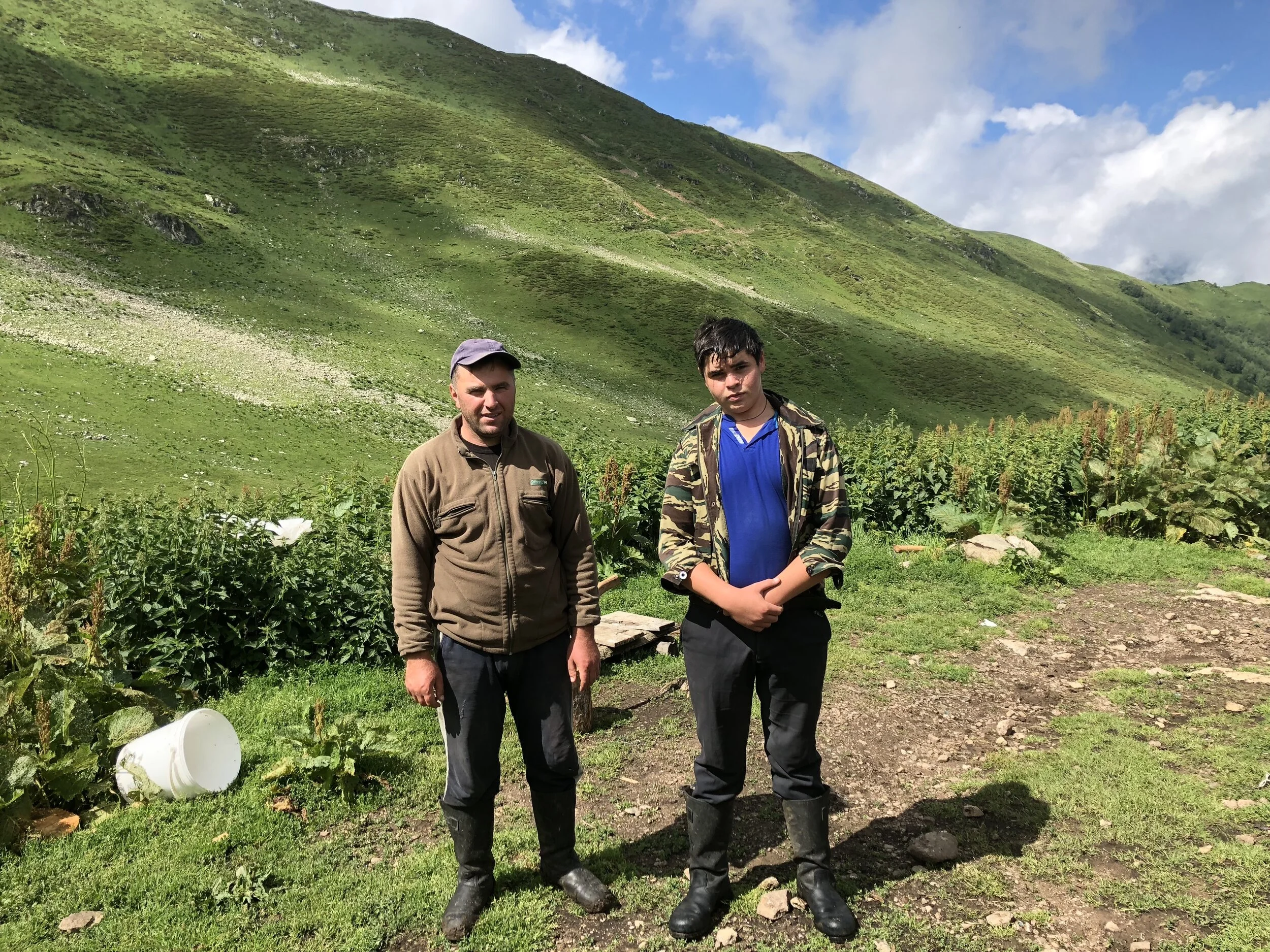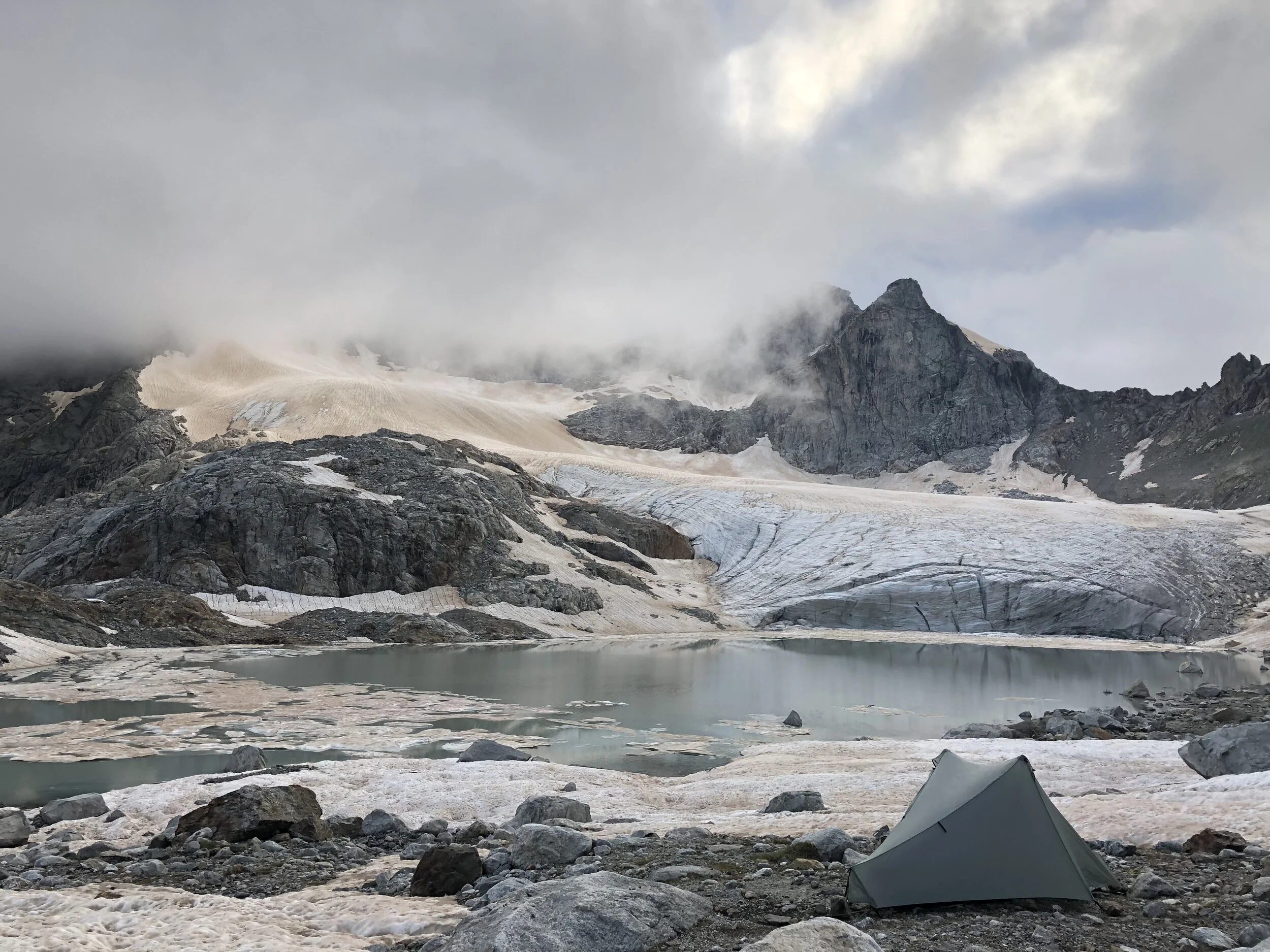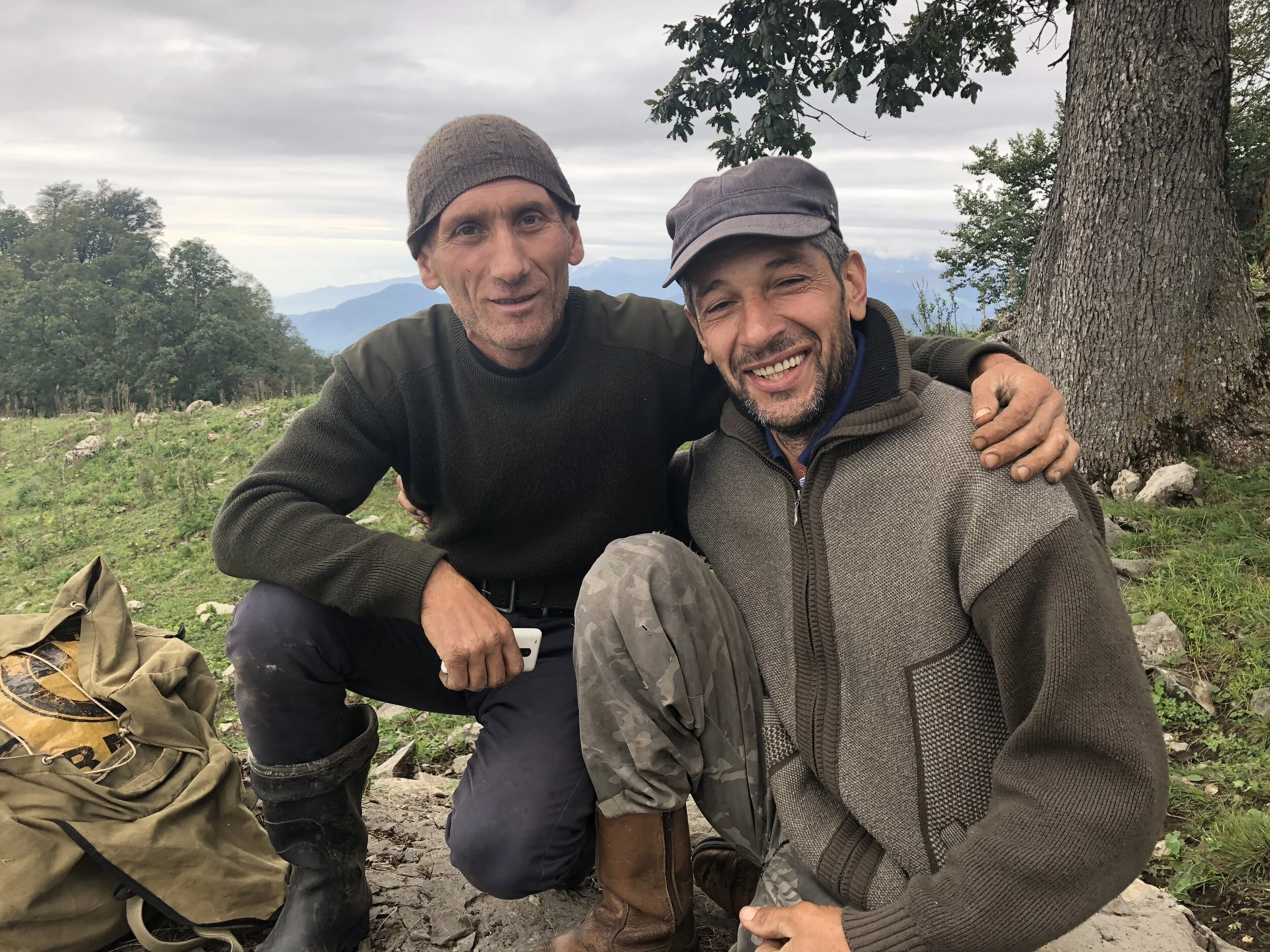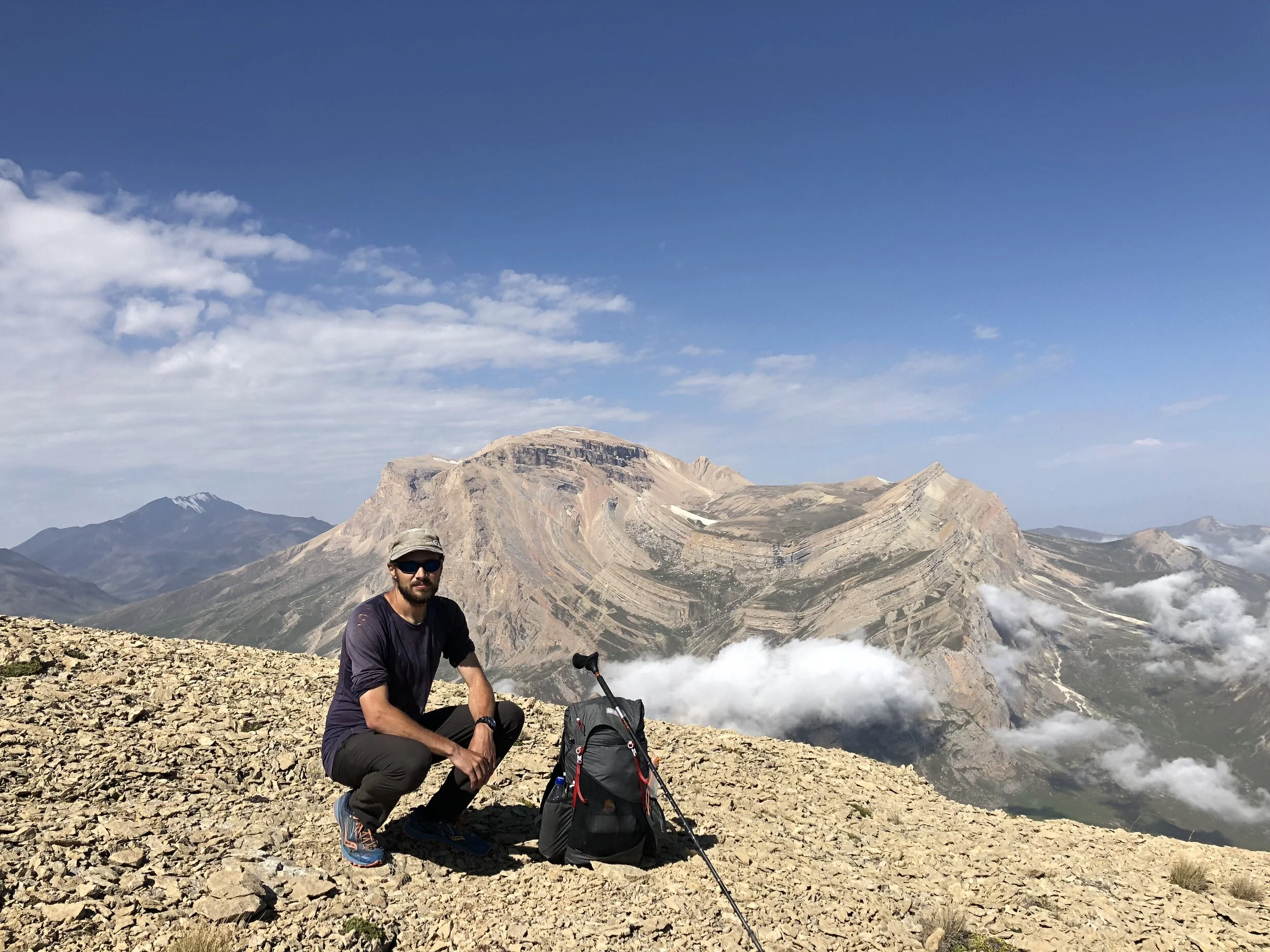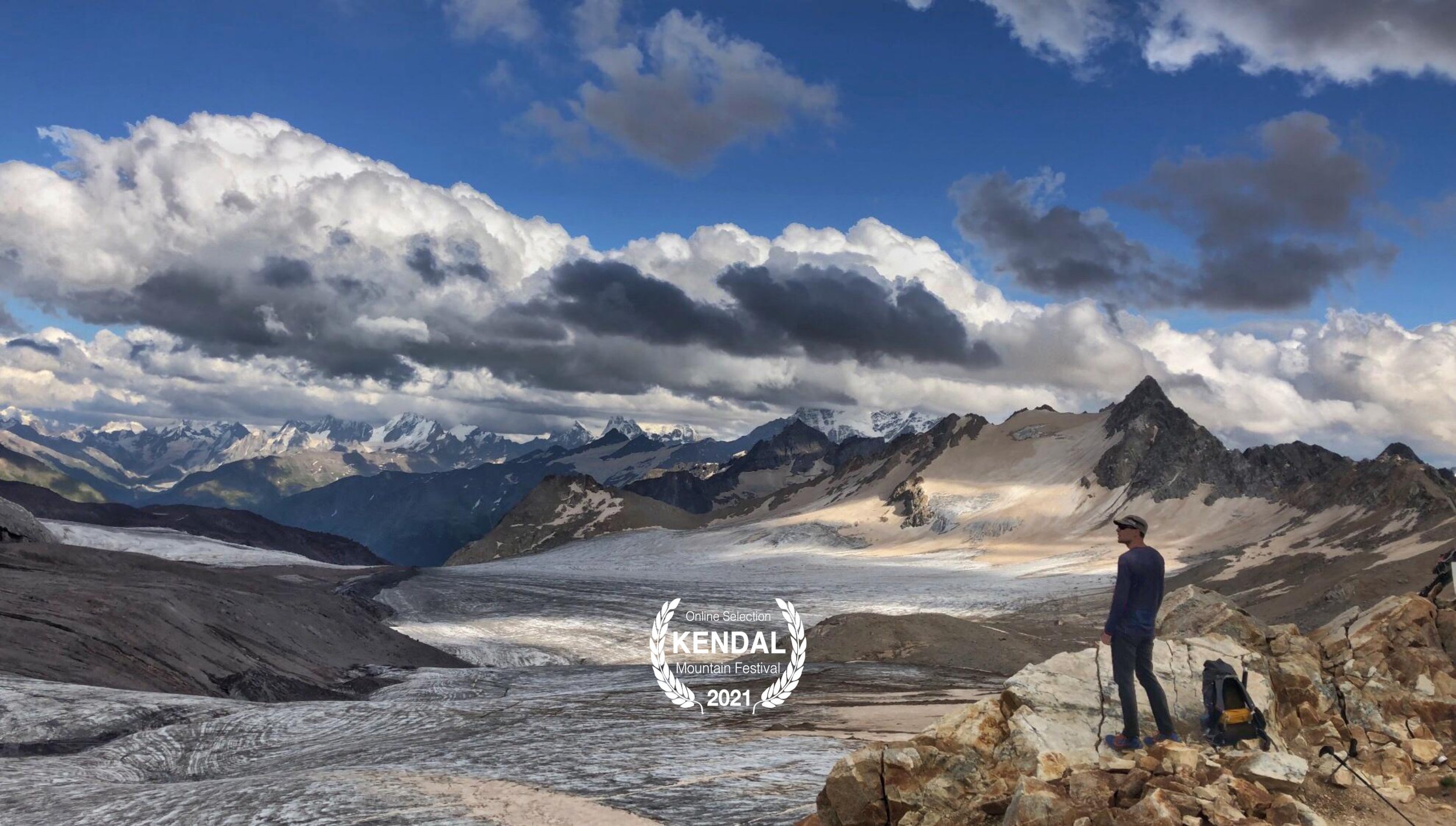
Crossing a mountain range divided by politics.
In 2018, Richard Hartfield set off alone into Russia's North Caucasus Mountains. His plan was to follow a 1200km backpacking route that he'd made on his phone. It led through tightly-controlled border areas in Russia, Georgia and Azerbaijan. But this self-shot, solo hiking adventure soon evolved into something else: A celebration of human kindness, set within regions more often perceived as divided and volatile.
Crossing The Caucasus premiered as part of the Kendal Mountain Film Festival in 2021.
Image credit: JeroencommonsaddingThe Route
My backpacking route began in the Russian city of Sochi and ended in Baku. Along the way, I hoped to cross the North Caucasus republics of Karachay Cherkessia, Kabardino Balkaria, North Ossetia and Ingushetia. After crossing the border between Russia and Georgia, I’d traverse the mountains in Tusheti and Kakheti to arrive on the border with Azerbaijan. From there, I would continue heading east via the Shahdagh National Park to reach the Caspian Sea.
During my nine week journey, I ended up having to re-route and skip several large sections of this route, due to permit restrictions and other challenges along the way.
No borders in the mountains
“Richard, if you travel in Russia alone then you are a dead man. I don’t think you understand what Russia is.”
These were the stark words of warning that I received from Igor- a software engineer from Moscow- a few days after I’d arrived in Russia during the summer of 2018. He’d been a total stranger to me hours before, but had gotten me out of trouble during a heated exchange with park officials, who were guarding access to a popular hiking trailhead in the foothills above Sochi.
The rangers had insisted that as a foreign citizen, I needed a special permit to use the trail. They threatened that I could be arrested. That’s when Igor had interrupted his holiday to calm them down and lead me away quietly. Passing walkers eyeballed us curiously as he spoke to me in broken English. A river roared beside the track- it carved its way down through endless swathes of forest that choked the surrounding foothills, and Igor’s eyes met mine with a look of deep concern. “What are you doing here?” he asked.
I began to tell him all about my carefully laid plans. I was about to begin a two-month hike across the entire Greater Caucasus Mountain range. I was following a route that I’d pieced together using satellite imagery, Russian mountaineering websites and soviet-era maps. First, I’d hike across several North Caucasus republics from the Black Sea in Russia; then I’d cross over into Georgia; and Azerbaijan to reach the Caspian Sea, 1200 kilometres later. It would be the most challenging long-distance backpacking route that I’d ever attempted.
It wasn’t just the alpine terrain and the lack of infrastructure that made the Greater Caucasus range an intimidating backpacking destination- it was the fact that I’d be walking along the Russian border, amidst breakaway republics and simmering conflicts. Just accessing the mountains meant navigating a maze of bureaucracy. By the time I’d boarded my flight from the UK, most of my route was unknown. Even back then, tensions between the UK and Russia felt high; with expulsions of foreign diplomats in response to the recent poisoning of Sergei Skripal in Salisbury. The UK foreign office’s travel advice for the North Caucasus was clear: “Avoid all but essential travel. There may be limited consular support available to you”.
But despite the reports of violent insurgencies in the North Caucasus and Russian-backed separatists in Georgia, there was another side to the Caucasus region that inspired me to go there. The maps revealed a tantalising mountain range, almost as big as the Alps, which had scarcely been touched by western tourism. The region was also home to dozens of ethnic groups that I knew little about. The prospect of backpacking alone across a hidden mountain range felt impossible to put down. I began teaching myself Russian, and I reached out to some local mountain guides on the internet for their advice about how I could walk there. I learnt that it required a litany of border zone permits, usually only accessible to teams of local mountaineers. Luckily, a few of the guides were curious about my plan. They agreed to help me apply for as many permits as they could, free of charge. We managed to get about half of them before I left.
Walls of bureaucracy
My first week in Russia saw me repeatedly denied access to the first 100 kilometres of my route. The local authorities’ excuses ranged from them ‘forgetting’ that the trail I wanted to take was in fact ‘closed’- to ambiguous ‘security concerns’ surrounding Russia’s hosting of the 2018 world cup. I even showed up at government office in the district of Adler, where they eventually agreed that one of their guides would personally escort me through the protected mountain reserve nearby. He’d sounded enthusiastic and friendly when we spoke on the phone, but then inexplicably quit just hours before we were due to meet at the trailhead the following morning.
I’d underestimated just how out of my control the bureaucracy was going to be. I was forced to give up on crossing the mountains above Sochi, and travelled further inland. But in the dusty town of Maikop, five policemen accosted me for smoking a cigarette outside of a bus station. They put my rucksack through a bomb scanner and marched me away for questioning. Once they’d grown tired of leafing through my passport, one of them tried to make me pay a bribe to get it back. I’d realised just how pervasive the corruption in Russia was, and how naive I’d been to think that I could stay out of trouble. The prospect of losing my passport, or being arrested without consular support nearby felt chilling.
Before I could gather my thoughts, I got off my bus in the next town, where a military officer on the street pulled me aside. He clearly recognised how anxious I was, and took me to buy a ticket to the nearest airport in Krasnodar. “It is very dangerous for you here” was his tight-lipped warning.
It felt like I’d wandered right into a John Le Carré novel. I ended up cowering inside a cheap hotel room, chain-smoking cigarettes and peering out the window. All of my worst nightmares about Russia seemed to have come true- nobody could be trusted. After a week of being there, I hadn’t walked anywhere. I made a phone call to one of the mountain guides who’d been advising me for months, to explain that I was leaving already.
“Don’t let these people intimidate you Richard!” Came his defiant response. “The only criminals in Russia are corrupt politicians and policemen. You have all your permits, so don’t let them try to pick on you!” He was adamant that if I just got into the mountains, then I’d see how friendly people were. I felt like I could trust him, and decided to keep going.
Into the mountains of Karachay Charkessia
Stepping off a rusty, soviet era-minibus in the republic of Karachay Cherkessia on day eight of my trip, I was finally able to link up with my hiking route. It felt as though I’d escaped from the eyes of the authorities. I set about climbing a 3000 metre-high pass above an empty ski resort to secure my freedom. Endless rows of snow-capped peaks stretched out in every direction. It was like creeping into a hidden world.
But as I edged my way down the other side of the pass, I couldn’t ignore how much late-lying snow clung to the northern slopes. Above a hideous run-out of crumbling cliff bands, I swore at myself for not bringing an ice axe. Things didn’t improve below, as the non-existent paths on my map led me through a maze of creaking boulder fields and chest-high rhododendron, before disappearing over a cliff. It felt like a trap, and I turned back to put up my tent.
Over the coming days, the North Caucasus Mountains presented me with the most committing and immersive hiking that I’d ever experienced. I climbed through pristine forests full of bear tracks, and stared out at a glaciated ridgeline separating Karachay Cherkessia from the break-away region of Abkhazia. Along with South Ossetia, it had been annexed from Georgia during a war against Russia in 2008. In a remote valley below, a beautiful river wound its way past camouflaged tents surrounded by sandbags- that was the first of many military checkpoints that lay along my route. I set off at dawn the following morning and crept past the encampment amongst dense trees on the other side of the river. I had a permit to be there, but I just couldn’t face being harassed by more corrupt officials in such a remote location.
During those first weeks, I was constantly wary of coming across some unseen patrol or checkpoint. I kept altering my route to stick to lower passes where the terrain felt safer. But as much as I cursed the guide who’d promised me that the Caucasus mountains would feel welcoming, I soon realised that he was right.
The North Caucasus republics in Russia are the home of many different ethnic groups; each with their own distinct language and culture. The majority of people that I met were muslim. I noticed little open hostility towards Russia, but people from the Caucasus just didn’t identify themselves as ethnic Russians. The first locals that I met were Karachay shepherds. They lived beside their flocks above the tree line for the entire summer, and were always stunned to meet a foreign walker alone in their mountains. They’d invite me into their camps for food, and show me where the best paths were. Each person that I met from the Caucasus was fiercely proud of their own region and traditions, but one thing that everyone seemed to share was a respect and a tolerance toward others, and a deep-held value for welcoming guests. Perhaps this is partly down to how multicultural the region is, but I also believe that living in the mountains helped remind people how much they relied upon one another. People would beckon me into their homes to meet three generations of their family and then stay for the night. I wouldn’t be allowed to leave again until I’d accepted more food than I could carry. I became aware of my own initial wariness around these strangers, and it highlighted some of my own prejudices. One man named Nikolai even gave me an old ice axe, and then chatted with the guards at a nearby checkpoint to make sure that they wouldn’t hassle me. The soldiers seemed impressed that I’d dared to visit. I began to realise that I wasn’t exploring some violent region from a news article- I was in somebody else’s home, and I longed to understand more about their stories.
Caught on a 3000 metre-high plateau during a thunder storm in the republic of Kabardino Balkaria, I was given shelter by Boris. He was a Balkar shepherd, who lived in his cabin near Mount Elbrus. He smiled cheerfully as we ate borscht in front of his wood-burning stove. I asked him about his family, and he explained that his parents were among the 400,000 Caucasus people who’d been deported to Central Asia by Stalin during World War 2. It was all done under the false accusation that they’d collaborated with the Nazis. Stripped of their ancestral lands, many thousands starved to death. It was 13 years before the survivors were allowed to return, only to find their homes occupied. This is just one of many chapters in the fascinating, but often tragic history of the Caucasus region. I was largely ignorant to it all, but meeting the people affected made it real. Looking at the news today, I see history threatening to repeat itself with the mass displacement and destruction being inflicted upon the people of Ukraine. As I said goodbye to Boris the following morning, he wished me good luck on my journey, and cheered “Druzhba! Druzhba!”, which is the Russian word for friendship.
Suspicious authorities
Unfortunately, it was on the 28th day of my hike that my time in Russia came to an abrupt and sour end. After walking down into the village of Verkhnayaya Balkariya, a brand new Audi estate pulled up beside me. Two men got out. One was wearing a military uniform, and the other was in plain clothes. The men already knew my name and simply told me to get in the car. They were members of the Russian FSB (formerly the KGB). I was driven to a house in the village, where a local school teacher nervously translated for them. The men wanted to know what I was doing in the North Caucasus and where I’d been walking. Recording our conversation, they demanded to see the photos on my phone, and instructed me to update them on my whereabouts until I’d left the country.
When the men finally drove off, I learnt that my permit application to walk in the neighbouring republic of North Ossetia had been denied. I was gutted, and travelled into the town of Vladikavkaz, where I could cross the border into Georgia. In the lobby of my hotel, I was stunned to come across the same mountain guide who’d convinced me not to leave Russia several weeks earlier. He’d been leading a group of Israeli tourists on a jeep tour through the surrounding mountains, when the FSB had also stopped them. Everyones fingerprints had been taken and the group were forced to return to their hotel. I struggled to imagine how he ran his business with incidents like that becoming increasingly common. His passion to share the North Caucasus with others was clearly heartfelt. If it hadn’t been for him, I wouldn’t have even been there. When I told him about my own experiences with the FSB, he sympathised: “I know how you feel Richard. It’s embarrassing that people should be treated this way in our country. I hope that one day it will change.”
Into Georgia and Azerbaijan
As I continued my journey through Georgia and Azerbaijan, a newly-established network of hiking trails had begun providing a welcome source of income to isolated mountain communities. Guesthouses had sprung up, and groups of university students from Tbilisi were building new trails. Outdoor tourism can sometimes become exploitative, but the lack of militaristic barriers against foreign visitors had at least given people in Georgia the freedom to decide what was right for themselves. It’s encouraged initiatives like the Transcaucasian Trail project- which I hope will offer communities in the Caucasus more ways to protect their culture and their land against more illicit developments- such as the illegal logging that’s been destroying areas of Azerbaijan.
If nothing else, tourism at least means that more eyes are watching for foul play. Now that Russia has been thoroughly decoupled from the west, with huge economic implications for its own citizens, I worry what the future holds for communities in the North Caucasus. I for one am keen to go back there. Mountains provide an important reality check against our perceived self-importance. Nowhere has this felt more poignant to me than in the Greater Caucasus range- where the politicised lines on the map became meaningless beneath its soaring ridge lines, and the apparent divisions between the people that I met were far weaker than our shared humanity. If there’s one thing that I now understand about Russia, it’s that it’s ultimately the same as everywhere else in the world: full of good people.




